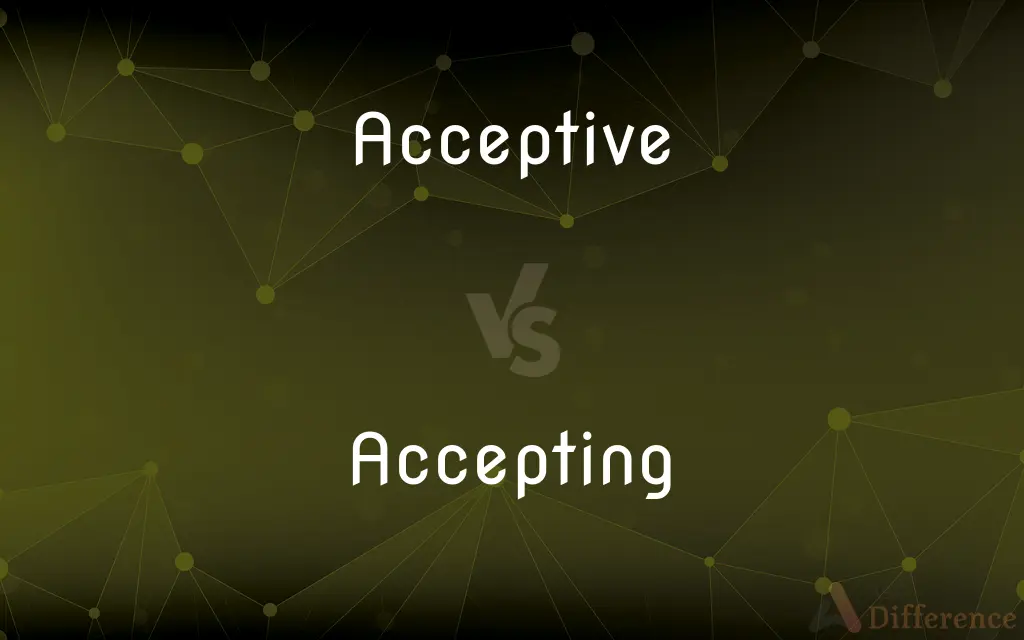Acceptive vs. Accepting — Which is Correct Spelling?
Edited by Urooj Arif — By Rabia Sajjad — Updated on April 23, 2024
Acceptive is the incorrect spelling of accepting. Accepting means willing to tolerate or accept people or situations.

Table of Contents
Which is correct: Acceptive or Accepting
How to spell Accepting?

Acceptive
Incorrect Spelling

Accepting
Correct Spelling
ADVERTISEMENT
Key Differences
Remember that "acceptive" is rarely used and not standard, whereas "accepting" is widely recognized and used.
"Accepting" is related to "accept," simply add "-ing."
The word "accepting" uses the common verb suffix "-ing" to indicate the present participle.
Think of "accept" + "ing" as combining to form accepting, which fits its definition of actively receiving or consenting.
The "-ing" in accepting indicates ongoing action, which aligns with its meaning of continuous tolerance.
ADVERTISEMENT
How Do You Spell Accepting Correctly?
Incorrect: Our community is acceptive of all its members.
Correct: Our community is accepting of all its members.
Incorrect: It’s important to be acceptive of different cultures.
Correct: It’s important to be accepting of different cultures.
Incorrect: She is very acceptive of new ideas.
Correct: She is very accepting of new ideas.
Incorrect: He was not very acceptive of my apology.
Correct: He was not very accepting of my apology.
Incorrect: They remained acceptive during the negotiations.
Correct: They remained accepting during the negotiations.
Accepting Definitions
Showing agreement or consent.
Nodding, she gave an accepting smile to the proposal.
Able to be received favorably.
His ideas were quickly accepting among his peers.
Receptive to different opinions or behaviors.
An accepting attitude helps in multicultural societies.
Willing to accept or tolerate someone or something.
The group was accepting of newcomers.
To answer affirmatively
Accept an invitation.
To agree to take (a duty or responsibility).
To receive (something offered), especially with gladness or approval
Accepted a glass of water.
Accepted their contract.
To admit to a group, organization, or place
Accepted me as a new member of the club.
To regard as proper, usual, or right
Such customs are widely accepted.
To regard as true; believe in
Scientists have accepted the new theory.
To understand as having a specific meaning.
To endure resignedly or patiently
Accept one's fate.
To be able to hold (something applied or inserted)
This wood will not accept oil paints.
To receive officially
Accept the committee's report.
To consent to pay, as by a signed agreement.
To take payment in the form of
A store that does not accept checks.
(Medicine) To receive (a transplanted organ or tissue) without immunological rejection.
To receive something, especially with favor. Often used with of.
Present participle of accept
Characterized by acceptance.
Tolerating without protest;
Always more accepting of coaching suggestion than her teammates
The atmosphere was judged to be more supporting and accepting
Acknowledging something reluctantly but without protest.
She was accepting of the fact that she needed help.
Accepting Meaning in a Sentence
Being accepting of criticism can help you improve.
The community is very accepting of different lifestyles.
He was accepting of her decision, even though it disappointed him.
She thanked her friends for being so accepting.
She practiced being more accepting with her children.
Schools should teach students about accepting others.
They worked on accepting each other's flaws in the relationship.
Accepting help is not a sign of weakness.
Accepting change can be difficult, but it is often necessary.
They are known for accepting all kinds of artistic expressions.
Parents need to be accepting of their children's choices.
Accepting the terms of the agreement, he signed the contract.
He found it hard accepting that he had lost.
Accepting that he needed support, he joined the group.
They thanked her for being accepting and understanding.
She had a warm, accepting smile that made everyone feel comfortable.
The teacher's accepting approach helped shy students participate more.
Being accepting doesn’t mean you agree with everything.
Accepting new challenges can lead to growth.
It's about accepting yourself as much as accepting others.
She aimed to create an accepting environment in her classroom.
Accepting your mistakes is the first step towards fixing them.
His accepting nature made him a great team leader.
Accepting different cultures enriches our own lives.
It's important to be accepting of feedback to improve your work.
Accepting Idioms & Phrases
Accepting with grace
Receiving something, often undesirable, with dignity.
She learned about accepting with grace during difficult times.
Accepting the inevitable
Coming to terms with something that cannot be avoided.
He was finally accepting the inevitable that the company was moving.
Widely accepting
Broadly acknowledged or received favorably.
The idea was widely accepting across the community.
Accepting at face value
Believing something based on its apparent truth without questioning.
He had a habit of accepting at face value, which sometimes led to misunderstandings.
Accepting an apology
Forgiving someone after they have apologized.
She had difficulty accepting an apology without a sincere effort to change.
Accepting defeat
Acknowledging loss without protest.
The team was accepting defeat with dignity.
Open and accepting
Being receptive and tolerant towards others.
The new policy created an open and accepting workplace.
Accepting of differences
Tolerant of diversity.
An accepting of differences is vital in a global business environment.
Accepting the challenge
Agreeing to take on a difficult task.
He looked forward to accepting the challenge of the new role.
Accepting responsibility
Acknowledging and taking charge of one’s actions.
Accepting responsibility for the mistake was his first step toward resolution.
Heartily accepting
Enthusiastically agreeing or receiving.
They were heartily accepting of the new policies.
Silently accepting
Quietly agreeing or consenting without verbal response.
She was silently accepting of the decision, though she was not happy.
Warmly accepting
Receiving or agreeing to something with warmth and enthusiasm.
They were warmly accepting of the guests at the event.
Accepting the call
Responding affirmatively to a request or duty.
She was accepting the call to lead her team.
Accepting the terms
Agreeing with the conditions presented.
After some negotiation, they were accepting the terms of the contract.
Accepting an invitation
Agreeing to attend or participate.
They were excited about accepting an invitation to the gala.
Accepting the facts
Coming to terms with reality.
He had trouble accepting the facts about the business's financial state.
Accepting an offer
Agreeing to take what is being proposed.
After considering it, he was accepting an offer from the new company.
Begrudgingly accepting
Accepting something with reluctance or lack of enthusiasm.
He was begrudgingly accepting of the new management.
Cautiously accepting
Accepting with reservations or care.
They were cautiously accepting of the proposed changes.
Common Curiosities
Why is it called accepting?
It is called accepting because it derives from the verb "accept," meaning to receive something willingly.
How do we divide accepting into syllables?
Accepting is divided into syllables as ac-cept-ing.
How many syllables are in accepting?
Accepting has three syllables.
How is accepting used in a sentence?
Accepting is used to describe the action or attitude of receiving something or someone willingly.
What is the first form of accepting?
The first form of "accepting" is "accept."
What is a stressed syllable in accepting?
The stressed syllable in accepting is the second syllable, "cept."
What is another term for accepting?
Another term for accepting is accommodating.
What is the verb form of accepting?
The verb form of "accepting" is "accept."
What is the root word of accepting?
The root word of accepting is "accept."
What is the pronunciation of accepting?
Accepting is pronounced as /əkˈsɛptɪŋ/.
Is accepting an adverb?
No, accepting is not an adverb.
Is the word accepting imperative?
Yes, accepting can be used as an imperative form of the verb.
What is the second form of accepting?
The second form of "accepting" is "accepted."
What is the singular form of accepting?
Accepting does not have a singular form as it is a verb.
What is the opposite of accepting?
The opposite of accepting could be rejecting.
Is accepting a collective noun?
No, accepting is not a noun.
Is the word accepting Gerund?
Accepting functions as a present participle and can be used as a gerund.
Which vowel is used before accepting?
The article "an" is used before accepting, as it starts with a vowel sound.
What part of speech is accepting?
Accepting is a verb (specifically, the present participle of accept).
Is accepting an abstract noun?
Accepting is not a noun; it's a verb and sometimes an adjective.
Is accepting a negative or positive word?
Accepting is generally considered a positive word as it implies openness and tolerance.
Is accepting a vowel or consonant?
The word accepting starts with a vowel sound.
Is the accepting term a metaphor?
Accepting can be used metaphorically to signify openness to ideas and change.
Which determiner is used with accepting?
Determiners like "the" can be used with accepting when it acts as a gerund.
Which conjunction is used with accepting?
Conjunctions like "and" and "but" can be used with sentences involving the word accepting.
What is the third form of accepting?
The third form of "accepting" is also "accepted."
What is the plural form of accepting?
Accepting does not have a plural form as it is a verb.
Is accepting a noun or adjective?
Accepting is a verb and can also function as an adjective.
Is accepting a countable noun?
Accepting is not a noun; it is a verb and sometimes an adjective.
Is the word “accepting” a Direct object or an Indirect object?
The word "accepting" can be used as a direct object in a sentence.
Which preposition is used with accepting?
Common prepositions used with accepting include "of" and "to."
Which article is used with accepting?
The article "an" is used before accepting when it starts a sentence or phrase.
Share Your Discovery

Previous Comparison
Totall vs. Total
Next Comparison
Omage vs. HomageAuthor Spotlight
Written by
Rabia SajjadEdited by
Urooj ArifUrooj is a skilled content writer at Ask Difference, known for her exceptional ability to simplify complex topics into engaging and informative content. With a passion for research and a flair for clear, concise writing, she consistently delivers articles that resonate with our diverse audience.










































